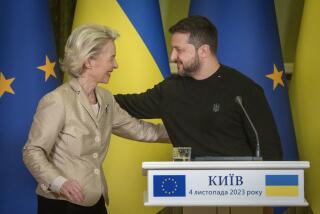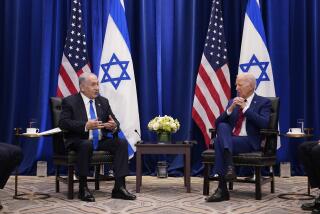U.S. Backs Full IMF, World Bank Membership for 6 Ex-Soviet States
- Share via
WASHINGTON — The United States recommended Friday that six former Soviet republics receive full membership in the International Monetary Fund and World Bank, a move that could make them eligible for billions of dollars in loans to ease their painful transition to market economies.
“The dramatic developments in the former Soviet Union have created new opportunities and challenges for international financial cooperation,” Treasury Secretary Nicholas F. Brady said in a statement.
He said the United States--the largest, most influential shareholder in the IMF and World Bank--now supports membership for Russia, Ukraine, Kazakhstan, Belarus, Armenia and Kyrgyzstan (formerly Kirghizia), the six republics with which Washington is establishing diplomatic relations. He said the Bush Administration will work to “ensure that their applications are considered as quickly as possible.”
The United States is willing to consider membership for the remaining six former Soviet republics, once it has established diplomatic relations with them, Brady said.
Only Ukraine has officially applied for membership in the international financial institutions. But most of the republics have made no secret of their desire to join.
Although former Soviet President Mikhail S. Gorbachev had sought full membership, the leading Western industrial powers, led by the United States, had staunchly opposed such a move. The most that Gorbachev obtained was a special associate status, giving Moscow access to the technical expertise of the IMF and World Bank but none of their financial resources.
Administration officials indicated last month that they were prepared to shift their stance. They noted that the dissolution of the Soviet central government had simplified the issue, because economic reform was no longer tangled in the complex relations between the Kremlin and the republics.
The IMF and World Bank make funds available to countries only after the nations have agreed to implement reforms under a blueprint that often requires them to take such painful steps as slashing budget deficits, privatizing state-run enterprises and decontrolling prices.
Through the IMF, the former Soviet republics are likely to find it easier to obtain certain types of assistance that was denied them in the past, one U.S. official said.
For instance, Russian Federation President Boris N. Yeltsin has been unable to persuade individual Western governments to commit billions of dollars toward a fund to be used to stabilize the value of the ruble after it begins trading on world currency markets. The governments argued that the money would be wasted unless it was part of a credible economic overhaul plan.
But once the Russian government has agreed to an IMF-sanctioned reform plan, such a fund “might be an important part of a developing IMF program over a period of months, where that piece is fashioned and fitted into a broader program,” a senior Treasury Department official said.
Meanwhile, the State Department announced Friday that the United States has established formal diplomatic relations with Yeltsin’s Russian Federation.
On Christmas Day, President Bush announced that the United States had proposed extending formal diplomatic recognition to six of the 12 former Soviet republics. State Department spokesman Richard Boucher said Friday that Yeltsin already had provided the formal response needed to establish diplomatic relations with Russia.
More to Read
Sign up for Essential California
The most important California stories and recommendations in your inbox every morning.
You may occasionally receive promotional content from the Los Angeles Times.










